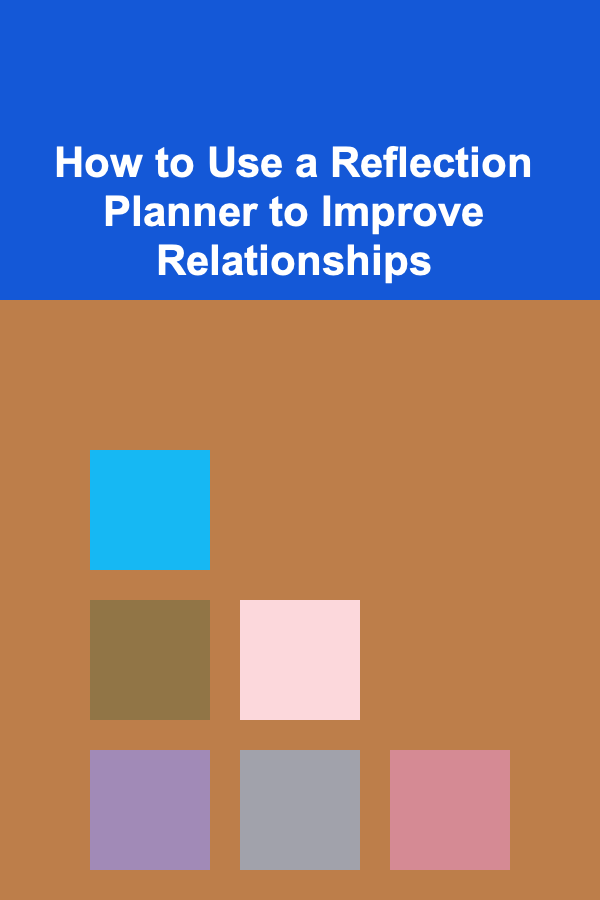
How to Use a Reflection Planner to Improve Relationships
ebook include PDF & Audio bundle (Micro Guide)
$12.99$5.99
Limited Time Offer! Order within the next:

In an increasingly busy and fast-paced world, relationships---whether personal or professional---are fundamental to our well-being and success. However, maintaining strong, healthy relationships can be challenging, especially as we navigate the complexities of modern life. A powerful tool that can help improve relationships is a reflection planner.
A reflection planner, at its core, is a tool for structured introspection. It's designed to help individuals evaluate their actions, thoughts, and emotions in a way that fosters greater self-awareness, understanding, and growth. By using a reflection planner, individuals can take a step back, assess their interactions, and identify patterns that may be either strengthening or hindering their relationships.
In this article, we'll explore the concept of a reflection planner, why it's effective, and how to use it to enhance your relationships. From improving communication to fostering empathy, we'll delve into how a reflection planner can be a transformative tool in your relational life.
What is a Reflection Planner?
A reflection planner is a tool designed to help individuals systematically reflect on their thoughts, behaviors, and emotions. It often includes prompts and exercises that guide you through the process of self-assessment, self-awareness, and goal-setting. The idea is that by regularly reflecting on your experiences, you gain insights into your own patterns, behaviors, and attitudes, which can then be used to make positive changes.
Reflection planners can vary widely, but most will encourage you to consider the following:
- Your thoughts and feelings
- Your actions and reactions in specific situations
- The impact of your behavior on others
- What you've learned from each experience
- Goals for future improvement
The goal of using a reflection planner is not just to assess what went well or poorly, but to create actionable steps for personal and relational growth. By evaluating and understanding your behavior, you can improve how you relate to others and create stronger, healthier relationships.
The Role of Self-Awareness in Relationships
Before diving into how a reflection planner can be used to improve relationships, it's important to understand why self-awareness is so critical. Self-awareness refers to the ability to recognize and understand your own emotions, thoughts, and behaviors, as well as how they influence others.
When you are self-aware, you can identify when your actions might be negatively affecting others, when you're communicating poorly, or when you're behaving in ways that don't align with your values. This level of awareness allows you to respond rather than react in situations, especially those that might involve conflict or misunderstandings.
Self-awareness is the foundation of emotional intelligence, and it's one of the key areas that a reflection planner can help you develop. By regularly reflecting on your thoughts, feelings, and actions, you begin to recognize patterns in how you behave in different situations, and you can adjust accordingly.
In relationships, self-awareness can help you:
- Understand your triggers: Recognize the situations or behaviors that upset you or cause you to react emotionally. This understanding allows you to manage your responses more effectively.
- Take responsibility for your actions: Instead of blaming others, self-awareness enables you to reflect on how your own actions contributed to the outcome.
- Increase empathy: When you understand your own emotions and behaviors, you're better able to understand the emotions and perspectives of others.
By building self-awareness through a reflection planner, you're setting the stage for healthier and more effective interactions in all your relationships.
How a Reflection Planner Helps Improve Relationships
Now that we understand the importance of self-awareness in relationships, let's look at how a reflection planner can specifically help improve your relationships. There are several key ways a reflection planner can facilitate growth and connection with others.
3.1 Improving Communication
Effective communication is one of the cornerstones of any healthy relationship. Whether it's with a partner, friend, family member, or colleague, how you communicate can determine the strength of the relationship. A reflection planner helps you assess your communication patterns, identifying where improvements can be made.
By reflecting on your daily interactions, you can ask yourself questions like:
- Was I clear in my communication?
- Did I actively listen to the other person, or was I more focused on getting my point across?
- Did I communicate with empathy and understanding?
- Were there any moments when I could have responded differently to avoid conflict?
Regular reflection on these questions will help you identify any weaknesses in your communication style, such as speaking too abruptly, interrupting others, or avoiding difficult conversations. Once you recognize these patterns, you can set goals to improve your communication in future interactions, leading to more positive, productive, and understanding conversations.
3.2 Enhancing Empathy
Empathy is the ability to understand and share the feelings of another person. It's a vital skill in any relationship, as it allows you to connect on a deeper emotional level and respond to others with care and compassion. A reflection planner can help you develop greater empathy by prompting you to consider others' perspectives during interactions.
Some reflection prompts you might include in your planner to build empathy could be:
- How did the other person feel during our interaction?
- What emotions might they have been experiencing that I didn't acknowledge?
- Was I able to understand their point of view, even if I disagreed?
- How could I have shown more empathy in that situation?
By regularly engaging with these prompts, you become more attuned to the emotions of others and improve your ability to respond with understanding. This, in turn, strengthens the emotional connection in your relationships.
3.3 Managing Conflict Effectively
Conflict is an inevitable part of any relationship. However, how you manage conflict can either strengthen or weaken a relationship. Using a reflection planner can help you evaluate how you handle disagreements, providing insights into whether your responses are constructive or detrimental.
Reflect on questions like:
- How did I handle the conflict in our conversation?
- Was I defensive or open to listening?
- Did I respect the other person's point of view, even if I disagreed?
- How could I have approached the conflict differently to avoid escalation?
With regular reflection, you can identify areas where your conflict management skills need improvement. Perhaps you tend to avoid confrontation, or maybe you become overly argumentative. By recognizing these tendencies, you can work on strategies to approach conflict in a healthier way, whether through active listening, finding common ground, or choosing your battles wisely.
3.4 Building Trust
Trust is the foundation of any successful relationship, and it takes time to build and effort to maintain. A reflection planner can help you assess how trustworthy you are and whether your actions are aligning with the goal of building trust in your relationships.
Some questions to reflect on might include:
- Did I keep my promises and follow through on commitments?
- Was I honest in our interactions, even when it was uncomfortable?
- Did I show consistency in my words and actions?
- How can I demonstrate more trustworthiness in my relationships?
By reflecting on these questions, you can identify ways to strengthen trust in your relationships. Whether it's by being more reliable, more open, or more transparent, a reflection planner helps you set tangible goals for fostering trust.
3.5 Improving Self-Compassion
Sometimes, the biggest barrier to improving our relationships is our own self-criticism. If you're hard on yourself and struggle with self-doubt, it can be difficult to show up authentically in relationships. A reflection planner can help you develop greater self-compassion, which will not only benefit your own well-being but also improve how you interact with others.
Regularly reflecting on your emotions, behaviors, and thoughts will help you become more understanding and forgiving toward yourself. Ask yourself questions like:
- How did I treat myself in this situation?
- Did I show myself kindness and understanding, or was I overly critical?
- How can I be more compassionate with myself moving forward?
By developing self-compassion, you become better equipped to show compassion toward others, creating a more empathetic and supportive dynamic in your relationships.
Creating a Reflection Planner for Relationships
Now that we've covered the benefits of using a reflection planner to improve relationships, let's discuss how you can create a personalized reflection planner that works for you.
4.1 Identify Your Reflection Goals
Start by identifying what areas of your relationships you want to improve. Do you struggle with communication? Do you want to become better at handling conflict? Are you looking to build deeper emotional connections with others? By identifying your goals, you can tailor your reflection prompts to focus on these areas.
4.2 Include Regular Reflection Prompts
A good reflection planner should include prompts that encourage you to reflect on specific aspects of your interactions. Some examples include:
- Communication: How clear was I in expressing myself today? Did I listen actively to the other person?
- Empathy: What emotions might the other person have been feeling during our interaction? Did I respond with empathy?
- Conflict: How did I manage conflict today? Was I able to stay calm and find a solution?
- Trust: Did I act in ways that built or eroded trust in my relationships?
4.3 Set Actionable Goals
For each area of reflection, set specific, measurable goals for improvement. For example, if you want to improve communication, you might set a goal to actively listen without interrupting in every conversation for the next week. Setting these goals helps you track progress and stay motivated.
4.4 Review and Adjust Regularly
Your reflection planner should be a dynamic tool that evolves with you. Set aside time to review your reflections periodically and assess whether you're making progress. Adjust your goals as needed to continue growing and improving your relationships.
Conclusion
A reflection planner is a powerful tool for improving relationships, both personal and professional. By promoting self-awareness, empathy, and thoughtful communication, a reflection planner helps you assess your behavior and interactions, allowing you to make intentional changes that strengthen your connections with others. Whether you're looking to build trust, resolve conflicts more effectively, or communicate more clearly, a reflection planner provides the structure and guidance you need to grow. Through consistent reflection and goal-setting, you can enhance your relational skills and build deeper, more meaningful relationships.
Reading More From Our Other Websites
- [Organization Tip 101] How to Choose the Right Fixtures for Your Kitchen and Bathroom
- [Needle Felting Tip 101] Best Ways to Fuse Needle Felting with Resin Casting for Durable Statement Pieces
- [Home Space Saving 101] How to Organize Your Closet to Save Space and Avoid Clutter
- [Organization Tip 101] How to Use Rolling Carts for Versatile Storage Solutions
- [Organization Tip 101] How to Continuously Improve Your Virtual Workspace Setup
- [Home Budget 101] How to Budget for Home Security Without Overspending
- [Home Storage Solution 101] How to Use Multi-Functional Furniture for Extra Storage
- [Personal Care Tips 101] How to Treat Hyperpigmentation Using Face Oil
- [Tie-Dyeing Tip 101] DIY Summer Wardrobe: Transform Old T-Shirts with Easy Ice Tie-Dye Tricks
- [Home Rental Property 101] How to Rent a Home with a Home Office for Remote Work Success

How To Introduce Basic Anatomy Through Play
Read More
How to Keep Your Pet's Ears Clean and Free of Infection
Read More
How to Plan a Family Storytelling Night at Home
Read More
Lowering Student Loan Interest Rates Through Refinancing: When Is the Right Time?
Read More
Saving Energy at Home: A Comprehensive Guide
Read More
Mastering Robot Navigation Algorithms: A Deep Dive
Read MoreOther Products

How To Introduce Basic Anatomy Through Play
Read More
How to Keep Your Pet's Ears Clean and Free of Infection
Read More
How to Plan a Family Storytelling Night at Home
Read More
Lowering Student Loan Interest Rates Through Refinancing: When Is the Right Time?
Read More
Saving Energy at Home: A Comprehensive Guide
Read More